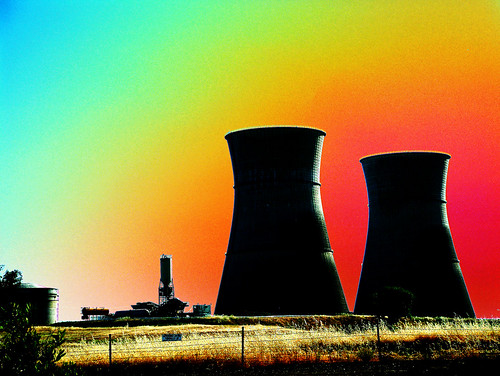Should we recycle nuclear waste?

 Like the nuclear waste itself, what to do with it seems an everlasting problem. Nobody wants it in their backyard, and with more nuclear plants potentially coming online, we'll have more of it around.
Like the nuclear waste itself, what to do with it seems an everlasting problem. Nobody wants it in their backyard, and with more nuclear plants potentially coming online, we'll have more of it around.
Speaking at an American Association for the Advancement of Science meeting over the weekend, Dale Klein suggests a change of mindset regarding the country's more than 60,000 tons of radioactive waste. Klein, the former chairman of the Nuclear Regulatory Commission (NRC), sees it as a resource rather than a waste.
After all, not all of what is considered nuclear waste can be painted with the same brush of day-glo paint. It can be anything from low-grade waste of contaminated equipment to high-level radioactive materials from the military, of which the U.S. has about 7,000 metric tons.
Reprocessing spent nuclear fuel involves extracting the uranium and plutonium from fission products and other leftovers to be used again to fuel nuclear reactors. According to Klein, this reduces the volume of waste that needs a resting place as well as lowering its radiation level.
A reprocessing plant, however, would be expensive and Americans may balk about bringing one to their community, whether it created jobs or not. Critics also point to nuclear proliferation, with the plutonium products getting in the wrong hands.
Klein, who is the now associate vice chancellor for research at the University of Texas System, said:
It is not waste. The waste is in our failure to tap into this valuable and abundant domestic source of clean energy in a systematic way. That's something we can ill-afford to do.
While it is true that the plutonium in recycled nuclear fuel is fissionable, no country in the world has ever made a nuclear weapon out of low-grade plutonium from recycled high burn-up nuclear fuel. It just doesn't work for a strategic or a tactical nuclear weapon.
Other countries, including France, are in the reprocessing game. The U.S. had been, too, but in the 1970s the Carter Administration ended the reprocessing program.
After publishing a report on nuclear energy last fall, Ernest J. Moniz, director of the MIT Energy Initiative, said in a statement:
Today, we would argue that we do not know whether spent fuel is a waste product or a resource. If the world continues to build once-through LWRs [light-water reactor], it can be treated as waste and simply disposed of in a geological repository, but if the industry in the U.S. and worldwide switches to self-sustaining uranium breeder reactors, then spent fuel will become an important resource, providing the raw material to be enriched and produce new fuel.
President Obama's FY 2012 budget includes $36 billion in loan guarantee authority to give a push to the domestic nuclear industry. Whether U.S. policy embraces reprocessing, we'd still need a repository for some radioactive materials. As far as a central, super long-term storage facility, Energy Secretary Steven Chu has crossed Yucca Mountain off the list of options. France, about 80 percent of its electricity through nuclear energy, may also have one of the first long-term geological repositories for radioactive waste by 2025.
Just last week, the states of New York, Vermont and Connecticut sued the NRC over its policy of keeping the waste on-site for 60 years after a nuclear plant shuts down. About 121 temporary facilities in 39 states contain the materials now.
Recommendations by the DOE's Blue Ribbon Commission, which is charged with the task of addressing the waste disposal issue, are expected this summer.
Related on SmartPlanet:
- What France plans to do with its nuclear waste
- Turning radioactive waste into glass
- Nuclear waste? Not in Yucca’s backyard
- China to develop a greener nuclear reactor
Image: Flickr/TahoeSunsets, Pacific Northwest National Laboratory, Hanford
This post was originally published on Smartplanet.com